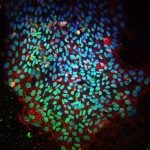Link to Pubmed [PMID] – 6140223
Infect. Immun. 1984 Jan;43(1):189-94
Fifteen unencapsulated B. fragilis strains isolated from human infections were examined for their capability to hemagglutinate erythrocytes of different species. Seven strains were found to hemagglutinate guinea pig and human (A,B,O) erythrocytes. This hemagglutination was resistant to treatment with D-mannose and several other sugars. Hemagglutinating strains were also capable of adhering to human epithelial cells and cultured human cell line (Intestine 407) and were 6- to 20-fold more adhesive than non-hemagglutinating strains. Pilus-like structures were found in negative-stained preparations on the hemagglutinating (and adhesive) strains but not on the others. Hemagglutinating and adhesive bacteria were 3- to 7-fold more sensitive to phagocytosis and 5- to 10-fold more sensitive to killing by human neutrophils than non-hemagglutinating ones.

